To escape Union bombardments during the 47-day Siege of Vicksburg, Miss., in 1863, civilians retreated to caves dug into the hillsides around the city. The caves were often furnished with amenities from home, but familiar items could not lessen the terror of coming under enemy mortar fire. In 1864 Mary Ann Loughborough published My Cave Life in Vicksburg, her riveting account of that ordeal, a portion of which is excerpted here. Loughborough survived and, after the war, moved with her family to Little Rock, Ark., where she founded the Southern Ladies Journal in 1883.
This night, as a few nights before, a large fire raged in the town. I was told that a large storehouse, filled with commissary stores, was burning, casting lurid lights over the devoted city; and amid all, fell—with screams and violent explosions, flinging the fatal fragments in all directions—our old and relentless enemies, the mortar shells….
Fearing to retire, I sat in the moonlight at the entrance, the square of light that lay in the doorway causing our little bed, with the sleeping child, to be set out in relief against the dark wall of the cave—causing the little mirror and a picture or two I had hung against the wall to show mis-shapen lengths of shadows—tinting the crimson shawl that draped the entrance of my little dressing room, with light on the outer folds, and darkening in shadow the inner curves;—beautifying all, this silvery glow of moonlight, within the darkened earth—beautifying my heart with lighter and more hopeful thoughts….
Days wore on, and the mortar shells had passed over continually without falling near us; so that I became quite at my ease, in view of our danger, when one of the Federal batteries opposite the intrenchments altered their range; so that, at about six o’clock every evening, Parrott shells came whirring into the city, frightening the inhabitants of caves wofully.
Our policy in building had been to face directly away from the river, and all caves were prepared, as near as possible, in this manner. As the fragments of shells continued with the same impetus after the explosion, in but one direction, onward, they were not likely to reach us, fronting in this manner with their course.
But this was unexpected—guns throwing shells from the battle field directly at the entrance of our caves. Really, was there to be no mental rest for the women of Vicksburg?





